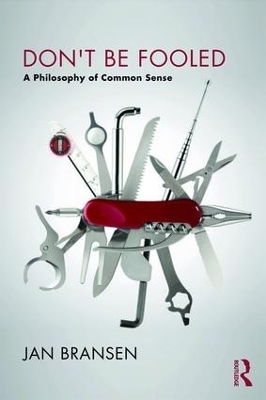
Don't be Fooled
Routledge (Verlag)
978-1-138-71677-3 (ISBN)
Where do we draw the line? Why do we appear to know more and more collectively, yet less and less individually? Has expertise painted itself into a corner? Can we defend both science and common sense?
In this engaging and much-needed book Jan Bransen explores these important questions and more. He argues that the rise of behavioural sciences has caused a sea change in the relationship between science and common sense. He shows how - as recently as the 1960s - common sense and science were allies in the battle against ignorance, but that since then populism and chauvinism have claimed common sense as their own. Bransen argues that common sense is a collection of interrelated skills that draw on both an automatic pilot and an investigative attitude where we ask ourselves the right questions. It is the very attitude of open-minded inquiry and questioning that Bransen believes we are at risk of losing in the face of an army of experts.
Drawing on fascinating examples such as language and communication, money, the imaginary world of Endoxa, domestic violence, and quality of life, Don't be Fooled: A Philosophy of Common Sense is a brilliant and wry defence of a skill that is a vital part of being human.
Jan Bransen is Professor of Philosophy of Behavioural Science at Radboud University in the Netherlands. He is the founder of Philosophical Explorations and has written scholarly work on practical identity, autonomy, narrative agency and love. Besides that, he publishes accessible books on the importance of cultivating a philosophical attitude to science, politics, media, mental health and modern life in general.
Introduction: How words liberate and captivate people
Part 1: Living with common sense
1. Humaning on Endoxa
2. Expectations between hope and prediction
3. Understandable, efficient and good behaviour
4. Trust and accommodation
5. Dealing with grey
Part 2: Living with expertise
7. Waking up without science
8. Understanding without objectivity
9. Satisfaction without policies
10. Responsibility without expert witnesses
Epilogue.
Bibliography
Index
| Erscheinungsdatum | 11.05.2017 |
|---|---|
| Verlagsort | London |
| Sprache | englisch |
| Maße | 138 x 216 mm |
| Gewicht | 226 g |
| Themenwelt | Geisteswissenschaften ► Philosophie ► Erkenntnistheorie / Wissenschaftstheorie |
| Geisteswissenschaften ► Philosophie ► Ethik | |
| Naturwissenschaften | |
| ISBN-10 | 1-138-71677-4 / 1138716774 |
| ISBN-13 | 978-1-138-71677-3 / 9781138716773 |
| Zustand | Neuware |
| Haben Sie eine Frage zum Produkt? |
aus dem Bereich

![Was heißt Denken?. Vorlesung Wintersemester 1951/52. [Was bedeutet das alles?] - Martin Heidegger](/media/113619842)
